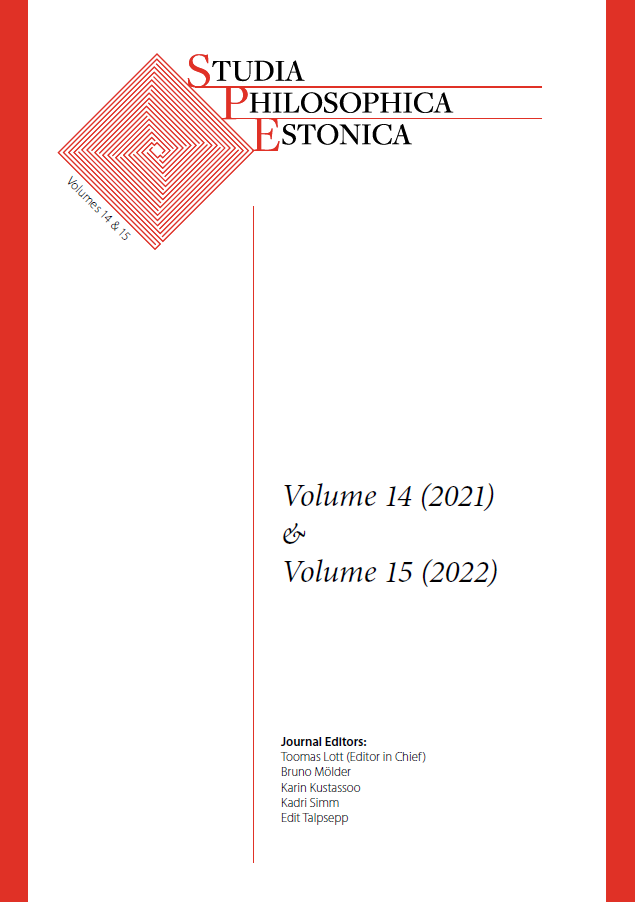Alexander of Aphrodisias' Lazy Arguments against Stoic Determinism
DOI:
https://doi.org/10.12697/spe.2022.15.01Keywords:
Alexander, De fato, Lazy Argument, Stoic determinism, fateAbstract
Scholars generally agree that Alexander of Aphrodisias' objections to Stoic determinism in De fato are unconvincing. I show that there is one argument, however, that is more successful than Alexander's other arguments. This argument is an innovative version of the so-called "Lazy Argument". Traditional versions of the Lazy Argument claim that actions and deliberations would not matter in a deterministic world and that for this reason Stoic determinism cannot be true. By contrast, Alexander's new version asserts that it is too risky to believe in Stoic determinism because it can give average rational agents good reasons to be lazy. Since we cannot know whether Stoic determinism is true, it is safer not to believe it.
References
Annas, Julia. Hellenistic Philosophy of Mind. Berkeley: University of California Press, 1992.
Bobzien, Susanne. Determinism and Freedom in Stoic Philosophy. Oxford: Oxford Universi-ty Press, 2004.
Brennan, Tad. The Stoic Life. Oxford: Oxford University Press, 2005.
Coughlin, Sean. “Cohesive Causes in Ancient Greek Philosophy and Medicine.” In Holism in Ancient Medicine and Its Reception, 237–67. Leiden: Brill, 2020.
Fischer, John Martin, and Mark Ravizza. Responsibility and Control: A Theory of Moral Re-sponsibility. Cambridge Studies in Philosophy and Law. Cambridge: Cambridge Uni-versity Press, 1998.
Frankfurt, Harry G. “Alternate Possibilities and Moral Responsibility.” The Journal of Phi-losophy 66, no. 23 (1969): 829–39.
Frede, Dorothea. “The Dramatization of Determinism: Alexander of Aphrodisias’ ‘De Fato.’” Phronesis 27, no. 3 (1982): 276–98.
Hahmann, Andree. “Mit Aristoteles gegen die Stoiker? Zufall und akzidentelle Verursa-chung in der Schrift ‘De Fato’ des Alexander von Aphrodisias.” Zeitschrift Für Philo-sophische Forschung 61, no. 3 (2007): 361–77.
Hankinson, R. J. “Determinism and Indeterminism.” In The Cambridge History of Hellenistic Philosophy, edited by Keimpe Algra, Jonathan Barnes, Jaap Mansfeld, and Malcolm Schofield, 513–41. Cambrdige: Cambridge University Press, 1999b.
Hankinson, R. J. “Explanation and Causation.” In The Cambridge History of Hellenistic Phi-losophy, edited by Keimpe Algra, Jonathan Barnes, Jaap Mansfeld, and Malcolm Schofield, 479–512. Cambrdige: Cambridge University Press, 1999a.
Inwood, Brad. Ethics and Human Action in Early Stoicism. Oxford: Oxford University Press, 1985.
Lockie, Robert. Free Will and Epistemology. London: Bloomsbury, 2018.
Long, A. A. “Freedom and Determinism in the Stoic Theory of Human Action.” In Problems in Stoicism, edited by A. A. Long, 173–99. London: The Athlone Press, 1971.
Long, A. A. “Stoic Determinism and Alexander of Aphrodisias De Fato (i-xiv).” Archiv für Geschichte der Philosophie 52, no. 3 (1970): 247–68.
Mele, Alfred R. “Free Will and Moral Responsibility: Manipulation, Luck, and Agents’ His-tories.” Midwest Studies In Philosophy 43, no. 1 (September 1, 2019): 75–92.
Pereboom, Derk. Living without Free Will. Cambridge Studies in Philosophy. Cambridge: Cambridge University Press, 2001.
Rackham, H., ed. Cicero: De Oratore III, De Fato, Paradoxa Stoicorum, De Partitione Ora-toria. Loeb Classical Library. Cambridge, Mass.: Harvard University Press, 1960.
Rolfe, John C., ed. The Attic Nights of Aulus Gellius. Cambridge, Mass.: Harvard University Press, 1946.
Sedley, David. “Chrysippus on Psychophysical Causality.” In Passions & Perceptions. Stud-ies in Hellenistic Philosophy of Mind, edited by Jaques Brunschwig and Martha C. Nussbaum, 313–31. Cambridge University Press, 2009.
Sharples, R. W. Alexander of Aphrodisias On Fate. London: Duckworth, 1983.
Sharples, R. W. “Aristotelian and Stoic Conceptions of Necessity in the De Fato of Alexan-der of Aphrodisias.” Phronesis 20, no. 3 (1975): 247–73.
Velleman, J. David. “What Happens When Someone Acts?” Mind 101, no. 403 (1992): 461–81.
Watson, Gary. “Free Agency.” The Journal of Philosophy 72, no. 8 (1975): 205–20.
Weidemann, Hermann. “Wetten, Daß ...? Ein Antikes Gegenstück Zum Wettargument Pascals.” Archiv Für Geschichte Der Philosophie 81 (1999): 290–315.
Wolf, Susan. Freedom Within Reason. Oxford: Oxford University Press, 1990.





